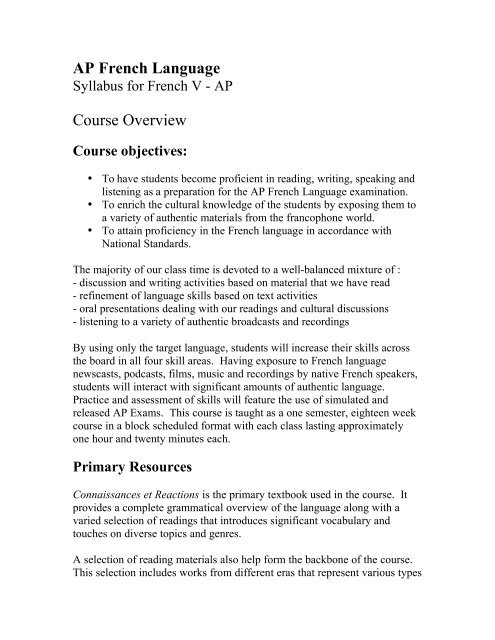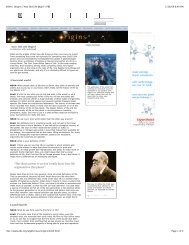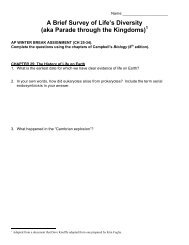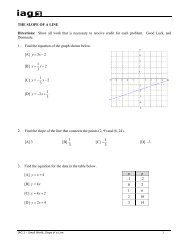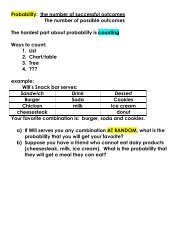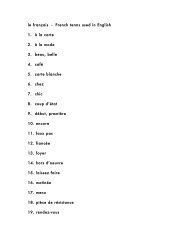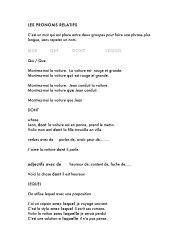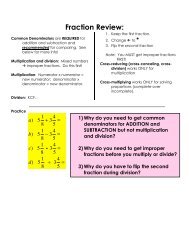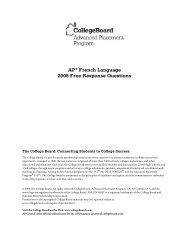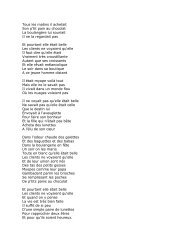AP French Language Course Overview
AP French Language Course Overview
AP French Language Course Overview
Create successful ePaper yourself
Turn your PDF publications into a flip-book with our unique Google optimized e-Paper software.
<strong>AP</strong> <strong>French</strong> <strong>Language</strong><br />
Syllabus for <strong>French</strong> V - <strong>AP</strong><br />
<strong>Course</strong> <strong>Overview</strong><br />
<strong>Course</strong> objectives:<br />
• To have students become proficient in reading, writing, speaking and<br />
listening as a preparation for the <strong>AP</strong> <strong>French</strong> <strong>Language</strong> examination.<br />
• To enrich the cultural knowledge of the students by exposing them to<br />
a variety of authentic materials from the francophone world.<br />
• To attain proficiency in the <strong>French</strong> language in accordance with<br />
National Standards.<br />
The majority of our class time is devoted to a well-balanced mixture of :<br />
- discussion and writing activities based on material that we have read<br />
- refinement of language skills based on text activities<br />
- oral presentations dealing with our readings and cultural discussions<br />
- listening to a variety of authentic broadcasts and recordings<br />
By using only the target language, students will increase their skills across<br />
the board in all four skill areas. Having exposure to <strong>French</strong> language<br />
newscasts, podcasts, films, music and recordings by native <strong>French</strong> speakers,<br />
students will interact with significant amounts of authentic language.<br />
Practice and assessment of skills will feature the use of simulated and<br />
released <strong>AP</strong> Exams. This course is taught as a one semester, eighteen week<br />
course in a block scheduled format with each class lasting approximately<br />
one hour and twenty minutes each.<br />
Primary Resources<br />
Connaissances et Reactions is the primary textbook used in the course. It<br />
provides a complete grammatical overview of the language along with a<br />
varied selection of readings that introduces significant vocabulary and<br />
touches on diverse topics and genres.<br />
A selection of reading materials also help form the backbone of the course.<br />
This selection includes works from different eras that represent various types
of literature. The readings include the twentieth century detective novel by<br />
George Simenon, Maigret et Le Clochard, Moliere’s L’Ecole des Femmes, a<br />
selection of readings from the period of romanticisme that includes prose<br />
excerpts and poetry, and Balzac’s Le Pere Goriot. These works are<br />
supplemented by a variety of newspaper and magazine articles and online<br />
readings.<br />
<strong>French</strong> <strong>AP</strong> is the resource that is used to aid students in the preparation for<br />
the <strong>AP</strong> exam. This text is divided into the four sections that are represented<br />
in the <strong>French</strong> <strong>AP</strong> exam. It provides critical preparation and practice for the<br />
skills required by the exam. The text has a cd component that offers<br />
listening practice for the two different listening portions of the exam. This<br />
resource is used more frequently as the course progresses.<br />
Une Fois Pour Toutes is the grammatical source that is used to supplement<br />
the primary textbook. It offers detailed explanations of all significant<br />
structures accompanied by challenging activities.<br />
<strong>Course</strong> Planner<br />
Week 1<br />
• Review the basic simple and compound tenses taught in the first four<br />
courses of the program along with essential irregular verbs<br />
• Writing assessments include short essays on vacation activities and plans<br />
for the current year<br />
• Reading the introduction to the Simenon novel “Maigret et le Clochard”<br />
• Listening to a podcast on author George Simenon<br />
• Assessment on review material<br />
• Assessment on the vocabulary and content of the novel chapter 1<br />
Week 2<br />
• Reading chapters 2-4 of novel / online reading @ BBC site<br />
• Listening to series #1 of <strong>AP</strong> <strong>French</strong> listening section (rejoinders)<br />
• Writing the 2001 <strong>AP</strong> essay<br />
• Speaking includes discussion of text and character profiles along with<br />
picture sequences 1 & 2 of <strong>AP</strong> <strong>French</strong><br />
• Assessments – chapters 2-4 comprehension/vocabulary
Week 3<br />
• Grammar – relative pronouns – chapter 15 Connaissance et Reactions<br />
• Reading - La Tour Eiffel - chapter 15 text / novel chapters 3-7<br />
• Listening – series #2 of rejoinders & extended dialogues<br />
• Writing – journal entries / relative pronoun worksheet<br />
• Speaking – picture sequences from 2001 <strong>AP</strong> exam & series #3 text<br />
• Assessments – Maigret chapter 3-7 quiz comprehension/vocabulary,<br />
relative pronoun quiz and graded speaking series #3<br />
Week 4<br />
• Grammar – function words from series #1 – 3 in <strong>AP</strong> <strong>French</strong> text<br />
• Reading - final chapter of Maigret novel<br />
• Listening – series 3 of rejoinders & extended dialogues<br />
• Performance Based Assessment #1 – Project based on Maigret novel,<br />
includes essay on original mystery story (student/author omits solution<br />
then leads class discussion/question session) and oral presentation role<br />
play of novel character<br />
Week 5<br />
• Grammar – subjunctive – chapter 16 text<br />
• Reading – historical and biographical information on Moliere followed<br />
by Act I of L’Ecole des Femmes<br />
• Listening – viewing of video version of play in <strong>French</strong> / series #4 of<br />
rejoinders and extended dialogues<br />
• Writing – 2002 <strong>AP</strong> exam essay and journal entries<br />
• Speaking – picture sequence from 2002 <strong>AP</strong> exam and series 4 text<br />
• Assessments – Act I Moliere quiz / subjunctive exam<br />
Week 6<br />
• Grammar – past subjunctive – activities from Une Fois pour Toutes<br />
• Reading – text chapter 16 (music) / Acts II & III Moliere<br />
• Listening – video of play / cloze activities based on songs in chapter 16<br />
text and supplemental songs<br />
• Writing – practice <strong>AP</strong> essays # 2 & #16 from <strong>AP</strong> <strong>French</strong> / modern <strong>French</strong><br />
rewrite of the maxims de marriage from play<br />
• Speaking – in class discussions of play themes and characters<br />
• Assessments – Acts II/III quiz / maxims rewrite / <strong>AP</strong> essays scored
Week 7<br />
• Grammar – function words from series 4 / verb fill ins from series 1 & 2<br />
• Reading – Acts IV & V play<br />
• Listening – video of play / series #5 rejoinders and extended dialogues<br />
• Writing – summaries of play / analysis of play themes<br />
• Speaking – picture sequence from series #5 text<br />
• Assessments – Performance Based Assessment #2 – Project based on<br />
Moliere’s L’Ecole des Femmes includes an essay comparing an aspect of<br />
17 th century <strong>French</strong> life compared to life in France today along with a<br />
debate centering on the role of women and the institution of marriage.<br />
Week 8<br />
• Grammar- plus-que-parfait & past conditional – chapter 19 text<br />
• Reading – La Parure by de Maupassant in chapter 19<br />
• Listening – series #5 & #6 rejoinders and extended dialogues / le journal<br />
en francais facile (rfi.fr)<br />
• Writing – practice <strong>AP</strong> essays # 6 # 22 from <strong>AP</strong> <strong>French</strong> text<br />
• Speaking – picture sequence from 2003 <strong>AP</strong> exam / series #6 text<br />
• Assessments – compound tense quiz / La Parure exam<br />
Week 9<br />
• Grammar – function words from series #5 / verb fill ins from series #3/#4<br />
• Reading – <strong>AP</strong> <strong>French</strong> reading series #1 & #2<br />
• Listening – BBC site listening activity / le journal en francais facile /<br />
teacher-generated podcast on romanticism<br />
• Writing – 2003 <strong>AP</strong> exam essay & journal entries<br />
• Speaking – picture sequence from 2003 <strong>AP</strong> exam<br />
• Assessments – in-class timed essay / romanticism quiz<br />
Week 10<br />
• Grammar – function words from series #6 / verb fill ins from series #5/#6<br />
• Reading - selections from teacher-generated packet (romanticism)<br />
including Chateaubriand’s Genie du Christianisme and Lamartine’s Le<br />
Lac.<br />
• Listening – le journal en francais facile / series #7 & #8 rejoinders and<br />
extended dialogues<br />
• Writing - practice <strong>AP</strong> essays #14 & #29 from <strong>AP</strong> <strong>French</strong> text<br />
• Speaking – picture sequence series #7 & #8 text<br />
• Assessments – quiz on romantic readings
Week 11<br />
• Grammar – les formes verbales from chapter 22 of text<br />
• Reading – remainder of romanticism packet with selections from Hugo<br />
and Baudelaire followed by presentation of several Verlaine works<br />
• Listening – recorded speeches of Hugo (rfi.fr) / le journal en francais<br />
facile<br />
• Writing – journal entries / essay on Hugo’s portrayal of the common<br />
man<br />
• Assessments – Performance based Assessment #3 – project based on<br />
romanticism that includes essay on romanticism and the movements that<br />
came before and after & oral presentation of student selected poem where<br />
student selects a song, a work of art and a video then explains the<br />
connection to the poem.<br />
Week 12<br />
• Grammar – function words and fill ins from series #7<br />
• Reading – background information on impressionism<br />
• Listening – teacher-created podcast on impressionism & video on history<br />
of impressionism<br />
• Writing – journal entries<br />
• Performance Based Assessment #4 – project based on impressionism and<br />
a visit to the Barnes Foundation (largest collection of impressionist art<br />
outside of the Musee d’Orsay-located 3 miles from our school) essay on<br />
the movement and oral presentation of two works of impressionist art by<br />
selected artists<br />
Week 13<br />
• Grammar – pronouns from chapter 13 of text<br />
• Reading – study of <strong>French</strong> art from chapter 13 / <strong>AP</strong> <strong>French</strong> reading series<br />
#3 / chapter 1 Le Pere Goriot<br />
• Listening – teacher-created podcast on Balzac / series #9 & #10<br />
rejoinders and extended dialogues<br />
• Writing – 2004 <strong>AP</strong> exam essay / journal entries<br />
• Speaking – picture sequences from 2004 <strong>AP</strong> exam<br />
• Assessments – pronoun quiz / Balzac exam / creation of image of Maison<br />
Vauquer from Balzac novel with character information
Week 14<br />
• Grammar – function words and verb fill ins from series #7<br />
• Reading – chapters 2-4 of Le Pere Goriot<br />
• Listening – le journal en francais facile / BBC site activity<br />
• Writing – practice essays #19 & #33 from <strong>AP</strong> <strong>French</strong> text<br />
• Speaking – picture sequences series #9 & #10 text<br />
• Assessments – Le Pere Goriot quiz / in class timed essay<br />
Week 15<br />
• Grammar – future and future perfect activities from Une Fois pour<br />
Toutes<br />
• Reading – finish Balzac novel<br />
• Listening – video on life of Balzac<br />
• Writing – essay on selected characters from novel<br />
• Speaking – oral presentation where each student performs a role play as a<br />
character from novel<br />
• Assessments – novel exam / future & future perfect quiz<br />
Week 16<br />
• Grammar – function and verb fill ins from series #8 & #9<br />
• Reading – excerpts from Pagnol’s Jean de Florette<br />
• Listening – view film Jean de Florette and Manon des Sources<br />
• Writing – 2005 <strong>AP</strong> exam essay / journal entries<br />
• Speaking – picture sequences from 2005 <strong>AP</strong> exam<br />
• Assessments – exam on content of films<br />
Week 17<br />
• Grammar – interrogative and demonstrative pronouns from Une Fois<br />
pour Toutes<br />
• Reading – <strong>AP</strong> <strong>French</strong> reading series #4 & #5<br />
• Listening – series #11 & #12 rejoinders and extended dialogues<br />
• Writing – practice essays #27 & #44 from <strong>AP</strong> <strong>French</strong> text<br />
• Speaking – picture sequences series #11 & #12 from <strong>AP</strong> <strong>French</strong> text<br />
• Assessments – pronouns quiz / in class timed essay<br />
Week 18<br />
• Grammar – review of major structures from course<br />
• Reading – La Derniere Classe / selection of readings from released <strong>AP</strong><br />
exams
• Listening – selection of released <strong>AP</strong> exam listening sections<br />
• Writing – final journal entries / 2006 <strong>AP</strong> exam essay<br />
• Speaking – picture sequence from 2006 <strong>AP</strong> exam<br />
• Assessment – final exam<br />
Teaching Strategies<br />
The overall structure of this course is built on a system of parallel strands of<br />
learning that reflect the four skill areas. Reading, speaking, listening and<br />
writing are taught in overlapping layers that compliment each other. Each of<br />
our 85 minute block scheduled classes generally contain elements of each<br />
skill, allowing for an immersion into the language and a facility with all<br />
skills. For every different reading selection that is assigned, essays on the<br />
content, themes and characters are required. Discussions of story line,<br />
background historical information and cultural insights take place. Students<br />
will listen to teacher read or recorded excerpts from our selection as well as<br />
questions on the reading. This four skills approach allows students to reach<br />
the level of proficiency that is required for success in the <strong>AP</strong> <strong>French</strong> exam.<br />
Reading<br />
A variety of readings are presented to the students from the very beginning<br />
of the course including essays, short stories, poems, excerpts from novels<br />
followed by full length novels and articles from newspapers and magazines,<br />
both in print and online. Prereading activities establish essential background<br />
information for the students as elements of history, culture, storyline and<br />
characters are discussed. Various reading strategies are used including the<br />
prereading discussions, in class readings, small group cooperative<br />
reading/discussions and homework reading assignments. New vocabulary is<br />
presented via glossed terms in the readers, teacher-provided lists and student<br />
research. Most of our readings lead to in class discussions that deal with<br />
comprehension of text, message of author and cultural/ historical<br />
connections. Reading skills are assessed through comprehension questions,<br />
essays, oral explanations / descriptions of character and plot development,<br />
along with vocabulary related questions. Students are introduced to <strong>AP</strong><br />
sample readings as the course progresses and are assessed via multiple<br />
choice questions as per the <strong>AP</strong> Exam.
Writing<br />
Writing skills are continuously developed throughout the course. Each<br />
student maintains a personal journal in which they enter a variety of writings<br />
that occur a minimum of twice each week. Entries may be based on a topic /<br />
question of the day, a description of life experiences, a question related to a<br />
current reading or current event, or on occasion a topic chosen by the<br />
student. With the goal of having the students write effective, well organized<br />
essays in forty minutes, timed essays in class take place escalating the time<br />
allotted to eventually reach the forty minute level. The nine point rubric<br />
used for scoring the <strong>AP</strong> Exam essay is used in evaluating student essays.<br />
Listening<br />
Listening skills are developed through a variety of resources that include<br />
several online tools such as newscasts, educational websites with cultural<br />
and literary recordings, text series recordings, music and released copies of<br />
the Grand Concours, SAT II and <strong>AP</strong> Exams. Educational cd-roms that are<br />
in the target language offer additional listening practice via simulated<br />
adventures and cultural readings.<br />
Speaking<br />
Oral skills are developed and assessed regularly. With all class activities<br />
conducted in <strong>French</strong>, students have the ability to become highly proficient<br />
speakers. Daily discussions of the readings, grammar topics and current<br />
events provide numerous opportunities for oral skill proficiency. Most<br />
major performance based assessments contain a speaking element.<br />
Extensive practice with <strong>AP</strong> Exam sample speaking questions that utilize the<br />
picture sequences give students the opportunity to attain higher level skills in<br />
speaking.<br />
Student Activities<br />
In addition to the aforementioned assessments, the <strong>French</strong> <strong>AP</strong> program<br />
requires students to complete four different Performance Based<br />
Assessments. These multi-faceted projects are linked to the major readings<br />
in the curriculum and there is one for each of our four grading periods. Each<br />
assessment has a variety of performance objectives that include essay
writing, oral performance and creation of audio-visual products. These<br />
assessments are culminating events that demonstrate mastery of both<br />
language and cultural /literary knowledge. Students are given approximately<br />
one week to complete these projects<br />
Student Assessment<br />
Student assessment has been detailed in the course planner. The essential<br />
element in <strong>AP</strong> <strong>French</strong> assessment is the variety of types of assessment that<br />
are offered. All four skill areas are continuously monitored by a creative<br />
mixture of assessments that measure the progress of students. As the course<br />
progresses towards the final weeks, assessments more closely resemble the<br />
format of the <strong>AP</strong> <strong>French</strong> exam.<br />
Technology in the Classroom<br />
The use of internet based activities has enriched the <strong>French</strong> <strong>AP</strong> experience<br />
by giving students access to a multitude of sites that offer authentic practice,<br />
especially in the areas of listening and reading. There are a number of<br />
websites that are listed for student use on a district based site where the<br />
teacher adds links on a continuous basis. Students are expected to research<br />
sites independently to aid in research and in language comprehension.<br />
Students also are encouraged and expected to use technology at home as<br />
they prepare projects and prepare for exams via text based sites that offer<br />
sample exam questions. <strong>AP</strong> Central has become an invaluable resource for<br />
our students with the array of released exams and testing strategies. A<br />
growing library of cd-roms provide cultural, literay and grammatical<br />
practice. Teacher generated podcasts provide students both in class and at<br />
home background information on a variety of subjects. Use of <strong>French</strong><br />
language newscasts are provided both from recorded cable television<br />
broadcasts and streamed online broadcasts. Music is provided via<br />
downloaded sources and burned cds.<br />
News, music and cultural information<br />
Journal Francais<br />
Articles on current events and <strong>French</strong> culture. Students may register for a<br />
free email version of the journal to be sent to them on a regular basis<br />
www.journalfrancais.com
Espacefrancophone<br />
This Louisiana based site serves as the portal for the <strong>French</strong> governmnt’s<br />
official cultural presence. It offers a multitude of free videos and<br />
educational material that may be downloaded or ordered by mail.<br />
www.espacefrancophone.org<br />
Radio France International<br />
This site offers a multitude of activities that include news broadcasts and<br />
grammar assistance as well as an entire language section that is geared for<br />
educators. This site features a daily broadcast entitled le journal en francais<br />
facile whose level of <strong>French</strong> is well suited to <strong>AP</strong> students, despite the use of<br />
“facile” in the title.<br />
www.rfi.fr<br />
Le Plaisir D’Apprendre<br />
A site that contains both music and cultural downloads from France<br />
http://www.leplaisirdapprendre.com<br />
<strong>French</strong> language /grammar information<br />
Tennessee Bob’s <strong>French</strong> Links<br />
A site with over 10,000 links to every kind of <strong>French</strong> language information.<br />
The “grammar central” portion of the site is quite complete.<br />
http://www.utm.edu/departments/french/french.html<br />
University of Texas <strong>French</strong> department grammar site<br />
A well organized site that lists all important grammar topics with detailed<br />
examples along with audio support.<br />
http://www.laits.utexas.edu/tex/gr/index.html<br />
BBC <strong>French</strong> language page<br />
Excellent source for a variety of listening activities as well as language<br />
practice<br />
http://www.bbc.co.uk/languages/french/index.shtml
Assorted online resources<br />
<strong>AP</strong> Central <strong>French</strong> home page<br />
The source for released exams and testing strategies<br />
http://apcentral.collegeboard.com/apc/public/courses/teachers_corner/2152.h<br />
tml<br />
Real <strong>French</strong> writing guide<br />
Complete and detailed guide on writing effective <strong>French</strong> essays<br />
http://www.realfrench.net/pdf/essay.pdf<br />
Ed Weiss’ Weblog<br />
This teacher’s site that contains teacher generated podcasts and links<br />
http://podcasts.haverfordsd.org/weblog/edweiss/<br />
Texts, Readers and Ancillary resources<br />
Cole, Charlotte and Floy Miller. Connaissances et Reactions. Heinle and<br />
Heinle, 1995.<br />
Sturges, Hales, Linda Cregg Nielsen, and Henry Herbst. Une Fois Pour<br />
Toutes. Longman, 1992.<br />
Ladd, Richard and Colette Girard. <strong>AP</strong> <strong>French</strong>-Preparing for the <strong>French</strong><br />
<strong>Language</strong> Examination. Prentice Hall, 1998.<br />
Ravise, J. Suzanne. Tableaux Culturels de la France. National Textbook<br />
Company, 1986.<br />
Literature<br />
Balzac, Honore. Le Pere Goriot. Larousse, 1998.<br />
Moliere. L’Ecole des Femmes. Larousse, 1999.<br />
Simenon, Georges. Maigret et le Clochard, EMI, 1998.<br />
Teacher prepared packet on romanticisme and 19 th century literature<br />
including: Chateaubriand, Genie du Christianisme, Lamartine , Le Lac,<br />
Hugo, Le Mendiant, Baudelaire, poems from Les Fleurs du mal, Verlaine<br />
poems including Chanson d’automne and


